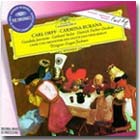Music |
Carmina Burana
Carl Orff
By
Published: Jan 01, 2008
Category:
Classical
Some would say that the most overplayed piece of classical music — if only because people continue to get married — is Pachelbel’s Canon in D.
Others would argue — because they stay at the hotel chain named after the music, and that chain has been known to pipe the piece into the lobby — that the most overplayed classical composition is Vivaldi’s Four Seasons.
I resolve the dispute by avoiding both pieces.
But I can’t avoid — no one can — the most over-used piece of music in film and commercials: Carl Orff’s Carmina Burana.
South Park. Star Wars. Excalibur. Natural Born Killers. Techno games. Gatorade commercials. And that’s just the tip of this music’s appeal to filmmakers and marketers who need emotion efficiently evoked.
The surprise: I may be sick of Pachelbel and The Four Seasons, but I have considerable patience for Orff’s piece. For what sounds on first listening like nothing more than drinking-and-brawling music — music that amps the listener’s spirits like Prokofiev’s Alexander Nevsky — turns out to be much more interesting than that.
On first listening: The words date from around 1230. Because the writers were students and young clergy, their subjects are the evergreen topics of youth: lust, drinking, wealth. In a word: excess. But because the lyrics are in Latin, they feel…holy.
On first listening: The music matches the words — medieval. It transports you to taverns. To ale served in pewter mugs. To men with wild beards and women with breasts spilling out of their bodices. And to battles nobly fought.
There is often nothing more contrived than simplicity, and that’s very much the case here. “Carmina Burana” sounds simple because it seems to have simple melodies and simple rhythms. But under the surface of this secular cantata are fast-changing, tricky changes — there’s a lot going on here that the civilian isn’t likely to notice.
You think you hear music composed in Germany in 1936 that might have been played in the Black Forest seven centuries earlier — and music that Hitler could easily love. In fact, the Nazis initially regarded “Carmina Burana” as degenerate music; they disapproved of its “immoral” aspects. Later, they came to see its value as propaganda.
“Carmina Burana” has a sad distinction: the most popular piece of music to come out of Nazi Germany. That’s surely why it wasn’t performed in the United States for two decades after the war. Now it’s a warhorse for choruses, late-night music for stoners in college dorms, and, whenever possible, a pick-me-up for mature listeners.
Which makes it music for everyone. Except, of course, snobs.
To buy “Carmina Burana” from Amazon.com, click here.


